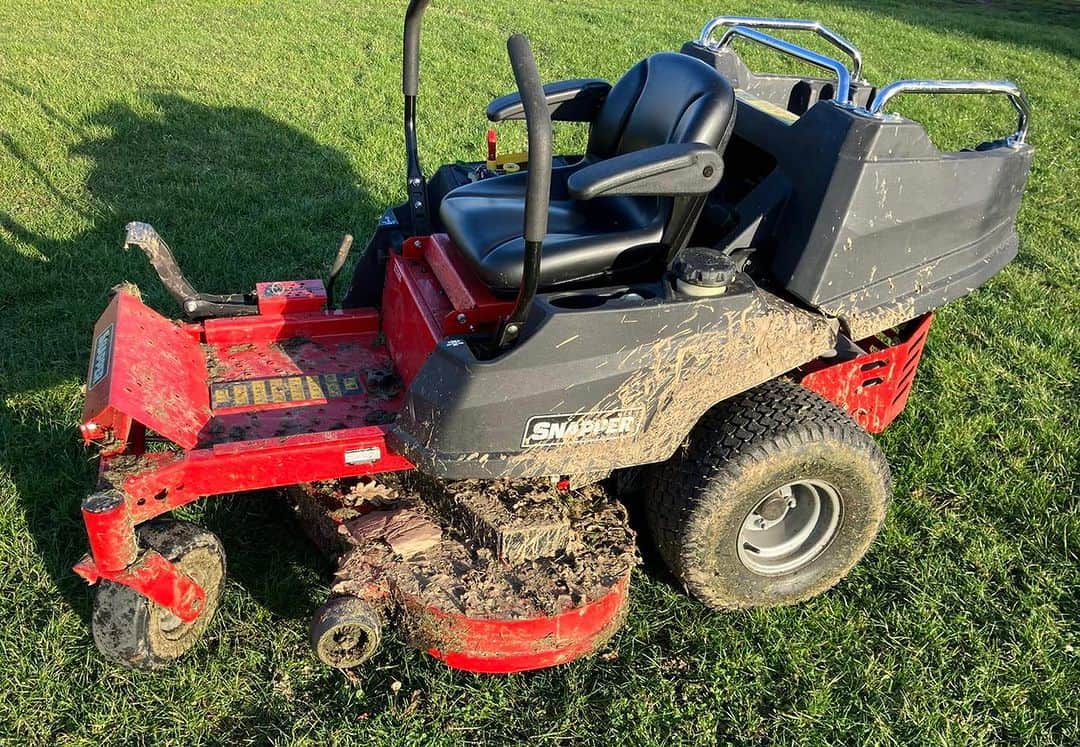Have you ever noticed some dark, oily smoke from your lawnmower’s exhaust? It may appear strange at first, but this is actually quite a common phenomenon. It can be concerning, but luckily, we’ve got some solutions that will ease your fears.
In this article, we’ll explain how lawnmowers work and why oil can be found in the exhaust. We’ll also discuss what to do if you notice this happening and how to prevent your lawnmower from emitting oil in the first place.
How Lawnmowers Work?

When operating a lawn mower, you must understand the different working parts of the machine and how they work together. A lawnmower typically consists of a 2-4 stroke motor powered by gasoline or diesel fuel and can be either self-propelled or push-mowed.
The motor is connected to a drive belt that turns the blades and drives the mower’s wheels. The exhaust system controls emissions from the engine and is composed of an exhaust pipe, muffler, and spark arrestor.
How the Lawnmower Exhaust System Works?
A lawnmower’s exhaust system controls emissions from the engine and comprises an exhaust pipe, muffler, and spark arrestor. The exhaust pipe runs from the combustion chamber to the muffler, which reduces loudness levels to comply with noise pollution regulations.
The spark arrestor prevents the spread of burning embers and sparks, which could cause a fire hazard. In some cases, unburned oil may collect in the exhaust system, producing an oily fluid from the exhaust pipe.
Working Parts of the Lawnmower
The various components in a lawnmower ensure its efficient operation. Its motor is the powerhouse of the machine and transmits power to the drive belt, which in turn drives both blades and wheels.
The fuel tank stores gasoline or diesel fuel and generally requires regular refilling. An air filter helps regulate air intake.
The spark plug and the exhaust system are two of the most important components of your lawnmower. The spark plug is responsible for igniting the fuel and air mixture that creates combustion in the engine.
The exhaust system is responsible for releasing the burned fuel from the engine as well as controlling emissions from the engine.
Causes of Oil in the Exhaust
Although exhaust systems often work properly and release the burned fuel into the atmosphere, it is not uncommon for oil to be detected in the exhaust as well.
Oil can make its way into your lawnmower’s exhaust system from various sources, but understanding the possible causes can help you take preventive measures to ensure your engine is running optimally.
1. Clogged Air Filter
A clogged air filter is one potential cause of an oil leak in the lawnmower exhaust. When not regularly changed, the air filter can become clogged with dust, debris, and oils. This restricts the flow of enough oxygen to the engine, resulting in inefficient combustion and increased unburned oil that can accumulate in the exhaust system.
Checking and changing your filter box regularly is imperative to prevent this issue. Or you can squeeze the excess oil from the foam air filter.
2. Damaged Piston Ring
Another possible cause of oil in the lawnmower exhaust is worn piston rings. The piston rings seal the combustion chamber and ensure efficient fuel burning in the engine.
When these rings become worn or damaged, they fail to provide a proper seal, allowing oil to leak into the exhaust system and exit via the exhaust pipe.
3. Overfilled Engine Oil
An overfilled engine oil level can also be the culprit for oily exhaust. When the engine oil becomes overfilled, it can enter the combustion chamber and seep into the exhaust valve.
To prevent this issue, always check your lawnmower’s oil levels as instructed and stay up to date with regular oil changes.
4. Problematic Spark Plug
A faulty spark plug can also cause oil to enter the exhaust. A worn or damaged spark plug can fail to ignite the fuel-air mixture efficiently, resulting in an increased amount of unburned oil that seeps into the exhaust system and out through the exhaust pipe.
To avoid this issue, have your spark plugs checked regularly and replaced as necessary.
5. Worn Valves
Worn or damaged valves can also cause oil to escape into the exhaust system. The valves regulate air intake and fuel burning in the motor. If worn or damaged, they may fail to close correctly, allowing unburned oil to pass through the exhaust pipe.
6. Overfilled Crankcase

An overfilled crankcase may be a cause of oil in the lawnmower exhaust. When too much oil enters the crankcase via the dipstick, it can be drawn into the combustion chamber or cylinders and escape through the exhaust pipe.
Regularly check your engine’s oil levels and top up as instructed in its user manual.
7. Carburetor Imbalance
When the carburetor is out of balance, it may fail to give the engine block the fuel-air mixture needed for efficient combustion. This can result in increased unburned oil entering the exhaust system and leaving via the exhaust pipe.
You should have your lawnmower’s carburetor checked by a professional mechanic if you suspect this is the issue.
Dangers of Oil in Your Lawnmower Exhaust
Keep an eye on the exhaust of your lawnmower. If you notice oil coming out, it could signify something wrong with your engine block and should not be ignored. Not only can this lead to poor performance, but it can also cause severe environmental damage if left unchecked.
Here are some of the dangers and risks associated with oil in your lawnmower exhaust:
1. Risk of Fire
Oil residue from the exhaust can build up and catch fire, resulting in a potentially dangerous situation. This is especially true if you’re mowing dead grass or leaves, so always be aware of any buildup near the engine.
2. Pollution
Lawnmowers are one of the leading contributors to air pollution in the form of white smoke. Oil in the exhaust can increase the number of harmful emissions (black smoke) released into the environment, causing lung disease.
The oil left unchecked in the lawnmower exhaust can cause increased pollution levels. This can have a detrimental effect on the environment, so keep your engine running as efficiently and cleanly as possible.
3. Engine Damage
If left untreated, oil residue in your lawnmower’s exhaust can corrode and damage the engine over time. This leads to costly repairs or even complete engine failure. This can also increase your lawnmower’s fuel consumption and reduce its efficiency.
If you’ve noticed oil in your lawn mower’s exhaust, take action as soon as possible. Check the manufacturer’s manual for proper instructions on maintaining and repairing your model.
Prevention and Solutions

To prevent and tackle oil from your lawnmower exhaust, you should maintain a regular servicing schedule for the engine. Keeping up with routine maintenance, such as checking and changing your air filter, spark plugs, and oil levels can help you avoid many of these issues.
1. Change Oil Regularly
Regular oil checking is essential for the maintenance of a lawnmower engine. Always check your oil levels as per the instructions in your owner’s manual and top up if necessary.
You must regularly change your engine’s oil, as worn or contaminated oil can cause damage to the engine and lead to oily exhaust fumes.
2. Inspect and Clean Air Filter
A clogged or dirty air filter can cause the engine to run less efficiently, increasing unburned oil in the exhaust. Inspect and clean the air filter regularly as your owner’s manual instructed to ensure optimal performance.
3. Check for Leaks
If there are any visible leaks in the engine or fuel lines, this can lead to an increase in oil entering the combustion chamber and into the exhaust. Check for any leaks and repair as necessary.
4. Replace Worn Parts
If you suspect worn or damaged parts are causing the issue, it is best to take your lawnmower to a mechanic for repair.
Replacing worn or damaged piston rings, valves, and spark plugs can help prevent excess oil from entering the exhaust system.
5. Replace the Spark Plug
The spark plug is a critical component of your engine, so replace it as necessary. If the spark plug is worn or damaged, it cannot ignite the fuel-air mixture efficiently, which results in unburned excess oil entering the exhaust system.
Replacing a faulty spark plug will ensure efficient combustion and reduce the amount of oil entering the exhaust.
6. Check for Damaged Valves
Check for damaged valves. If the valves are worn or damaged, they may not close properly and allow unburned excess oil to pass through the exhaust pipe. To fix this oil leakage, take your lawnmower to a professional mechanic.
Final Thoughts
Oil from your lawn mower’s exhaust can indicate a problem with the lawn mower engines and should be addressed promptly. Additionally, inspect and clean the air filter regularly, replace worn or damaged parts, and replace the spark plug when necessary.
Adhering to a regular maintenance schedule for your lawnmower engine can go a long way in preventing oil from entering the exhaust system. These steps will ensure your lawnmower’s engine runs appropriately and functions optimally.
What other preventive measures do you take to avoid oil entering the exhaust system? Share your tips and advice in the comments below!
